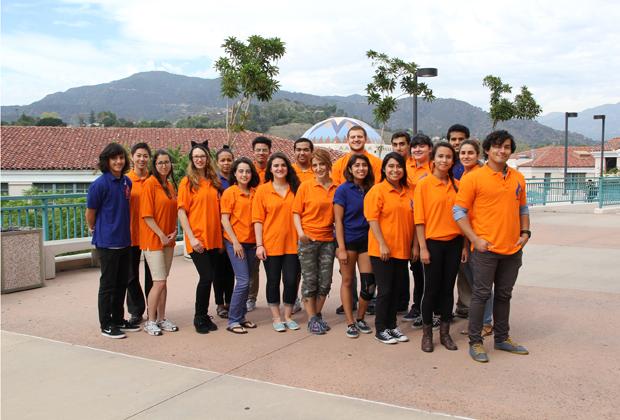Peer Mentoring Helps Ease Transition to College
SPARK: Peer mentors and mentees of SPARK smile for the camera to capture their camaraderie.
The transition between high school and college can be daunting. According to The National Student Clearinghouse, approximately half of students who enroll in college end up dropping out.
At Glendale College, the Students Providing Assistance Resources and Knowledge (SPARK) aims to tackle this statistic.
SPARK began in 2010 as an extension of Shadow Days, a program administered through the Student Outreach Services. Spearheaded by Financial Aid and Outreach Technician Armineh Gourgian, Shadow Days invited high school students to participate in a simulated college experience by being paired up with a current college student for a day.
While the program was effective, it had room for growth. A conversation between Gourgian and Senior Student Services Program Coordinator Hoover Zariani would prove to be the start of a project that is now firmly established as SPARK.
“We were talking and we wanted something that would make the experience more meaningful for the students. Something a little more lasting to help the students get through their first semester. This is where the idea came from,” Zariani said.
The duo worked together for five years and created a long-term program that offers first-year students a more permanent anchor of support to help ease their transition into college. Through SPARK, entering freshmen are matched with an experienced second-year student that guides them through the initial phases of school.
The program is now managed jointly by Zariani and Nane Kakosian, student services technician.
SPARK runs from June through December and students interested in mentoring may begin applying in January. Successful applicants are those who demonstrate a strong sense of empathy and sociability.
Mentees are identified by Student Equity counselors at the college. If interested, they enroll in the Summer Bridge Program where they take a student development course and receive math and English assessment preparation. In the final week of the summer session, the mentees are paired up with their mentor of choice.
Throughout the fall semester, mentors and mentees meet regularly to touch base. The program also works to familiarize participants with campus resources. This semester, they have visited the Learning Center, Career Center and Transfer Center.
Zariani and his team firmly believe in the importance of SPARK. The experience for first-time college students can be overwhelming and many may feel lost or confused, which is what SPARK works to remedy. “[College is] too big and there’s too many things to know. No one knows everything so to have a support network is really important,” Zariani said.
In his office, Zariani houses a binder with anonymous testimonials from mentees who boast about the program’s effectiveness. “This is such an amazing program. I am glad that I had such a good experience,” one of the mentees said.
The program aims to be mutually beneficial. Mentors gain valuable job experience and are able to hone in on important skills. Zariani and Kakosian work closely with the mentors to monitor their progress.
“We encourage their work. We ask them to write journals to reflect on their interaction with mentees. It’s not just about doing hours, it’s about what they learned and how the process is coming along,” Zariani said.
Firas Hikmat, a second-year biology student, participated in the program as a mentee and has now moved on to become a mentor. As a first-year student, he did not know much about the campus which made things difficult and having a mentor to turn to for guidance was invaluable. “I got to know my mentor a lot and she helped me since we were in the same major,” Hikmat said.
What started as a mere idea between two coworkers has now grown to become a well-established part of Glendale College, but Zariani remembers the uncertainty that surrounded the program in its pilot stages.
“When SPARK started, it had no funds and no proper staffing. Each of us took on the task of making it into a more mature program. Each year we learned and we made adjustments,” he said.
He hopes to continue improving SPARK, and while funding is guaranteed for the next three years, the program’s future remains to be determined beyond that. “I think if we show that it’s helping students, hopefully it will continue,” Zariani said.

Irene Abramian is of Armenian descent, was born and raised in Sweden and has lived in the US for a little over 10 years. Coming from a multi-cultural background,...

